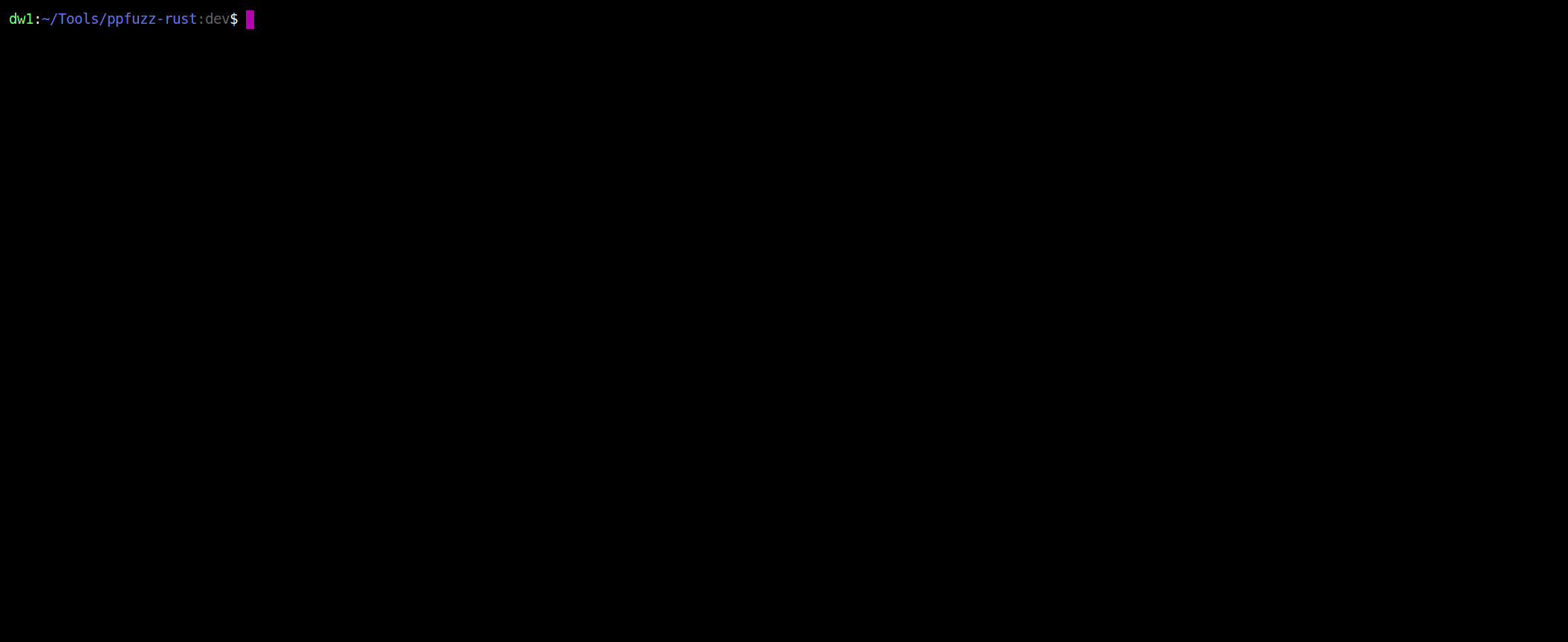https://github.com/dwisiswant0/ppfuzz
A fast tool to scan client-side prototype pollution vulnerability written in Rust. 🦀
https://github.com/dwisiswant0/ppfuzz
bugbounty bugbounty-tool bugbountytips chromium prototype-pollution rust rust-tools security security-tools vulnerability-scanners
Last synced: 7 months ago
JSON representation
A fast tool to scan client-side prototype pollution vulnerability written in Rust. 🦀
- Host: GitHub
- URL: https://github.com/dwisiswant0/ppfuzz
- Owner: dwisiswant0
- License: mit
- Created: 2021-06-15T06:31:46.000Z (over 4 years ago)
- Default Branch: master
- Last Pushed: 2023-03-20T15:01:05.000Z (over 2 years ago)
- Last Synced: 2025-05-10T10:04:23.435Z (7 months ago)
- Topics: bugbounty, bugbounty-tool, bugbountytips, chromium, prototype-pollution, rust, rust-tools, security, security-tools, vulnerability-scanners
- Language: Rust
- Homepage:
- Size: 68.4 KB
- Stars: 615
- Watchers: 7
- Forks: 60
- Open Issues: 11
-
Metadata Files:
- Readme: README.md
- Funding: .github/FUNDING.yml
- License: LICENSE
Awesome Lists containing this project
- WebHackersWeapons - ppfuzz - side prototype pollution vulnerability written in Rust. 🦀||[`prototypepollution`](/categorize/tags/prototypepollution.md) [`prototype-pollution`](/categorize/tags/prototype-pollution.md)|[](/categorize/langs/Rust.md)| (Weapons / Tools)
- awesome-hacking-lists - dwisiswant0/ppfuzz - A fast tool to scan client-side prototype pollution vulnerability written in Rust. 🦀 (Rust)
- awesome-offensive-rust - Ppfuzz - A fast tool to scan client-side prototype pollution vulnerability written in Rust. (Projects)
README
# ppfuzz
Prototype Pollution Fuzzer

A fast tool to scan client-side prototype pollution vulnerability written in Rust. 🦀
- [Installation](#installation)
- [Binary](#binary)
- [Source](#source)
- [Dependencies](#dependencies)
- [Demonstration](#demonstration)
- [Usage](#usage)
- [Basic](#basic)
- [Options](#options)
- [Usage](#usage)
- [Supporting Materials](#supporting-materials)
- [Contributing](#contributing)
- [Attribution](#attribution)
- [Acknowledments](#acknowledments)
- [License](#license)
---
## Installation
### Binary
Simply, download a pre-built binary from [releases page](https://github.com/dwisiswant0/ppfuzz/releases) and run!
### Source
NOTE: Rust should be installed!
Using `cargo`:
```bash
▶ cargo install ppfuzz
```
#### — or
Manual building executable from source code:
```bash
▶ git clone https://github.com/dwisiswant0/ppfuzz
▶ cd ppfuzz && cargo build --release
# binary file located at target/release/ppfuzz
```
### Dependencies
**ppfuzz** uses [chromiumoxide](https://github.com/mattsse/chromiumoxide), which requires Chrome or Chromium browser to be installed.
If the `CHROME` environment variable is set, then it'll use it as the default executable. Otherwise, the filenames `google-chrome-stable`, `chromium`, `chromium-browser`, `chrome` and `chrome-browser` are searched for in standard places. If that fails, `/Applications/Google Chrome.app/...` _(on MacOS)_ or the registry _(on Windows)_ is consulted.
## Demonstration

As you can see in the demo above _(click to view in high-quality)_, **ppfuzz** attempts to check for prototype-pollution vulnerabilities by adding an object & pointer queries, if it's indeed vulnerable: it'll fingerprinting the script gadgets used and then display additional payload info that could potentially escalate its impact to XSS, bypass or cookie injection.
## Usage
It's fairly simple to use **ppfuzz**!
```bash
▶ ppfuzz -l FILE [OPTIONS]
```
### Basic
Use `-l/--list` to provide input list:
```bash
▶ ppfuzz -l FILE
```
You can also provide the list using I/O redirection:
```bash
▶ ppfuzz < FILE
```
— or chain it from another command output:
```bash
▶ cat FILE | ppfuzz
```
Only show vulnerable targets/suppress an errors:
```bash
▶ ppfuzz -l FILE 2>/dev/null
```
### Options
Here are all the options it supports:
```bash
▶ ppfuzz -h
```
| **Flag** | **Description** | **Default value** |
|------------------- |---------------------------------------- |------------------- |
| -l, --list | List of target URLs | |
| -c, --concurrency | Set the concurrency level | 5 |
| -t, --timeout | Max. time allowed for connection _(s)_ | 30 |
| -h, --help | Prints help information | |
| -V, --version | Prints version information | |
## Supporting Materials
- [Nuclei templates](https://github.com/projectdiscovery/nuclei-templates/blob/master/headless/prototype-pollution-check.yaml)
- [PPScan](https://github.com/msrkp/PPScan)
- [Prototype Pollution and useful Script Gadgets](https://github.com/BlackFan/client-side-prototype-pollution)
- [JavaScript prototype pollution attack in NodeJS](https://github.com/HoLyVieR/prototype-pollution-nsec18/blob/master/paper/JavaScript_prototype_pollution_attack_in_NodeJS.pdf)
- [Prototype pollution – and bypassing client-side HTML sanitizers](https://research.securitum.com/prototype-pollution-and-bypassing-client-side-html-sanitizers/)
## Contributing
[](https://github.com/dwisiswant0/ppfuzz/issues)
When I started **ppfuzz**, I had very little or no knowledge on Rust and I believe there may be a lot of drawbacks/security vulnerabilities. So all contributions are welcome, of course — any bug reports & suggestions are appreciated, some environment have not been tested yet.
## Attribution
Besides being my learning medium, this tool was created because it was inspired by [@R0X4R](https://twitter.com/R0X4R/status/1402906185301323776)'s tip on [how to automate prototype pollution checking](https://twitter.com/R0X4R/status/1402906185301323776) using [page-fetch](https://github.com/detectify/page-fetch).
Cross-compile GitHub workflow inspired by [crodjer](https://github.com/crodjer)'s [sysit](https://github.com/crodjer/sysit/commit/160bdae51b2c90c3b6e8a0e6c4832506ebc55694).
## Acknowledments
Since this tool includes some contributions, I'll publically thank the following users for their helps and resources:
- [@mattsse](https://github.com/mattsse) - for his awesome [chromiumoxide](https://github.com/mattsse/chromiumoxide) & mentoring me which helped a lot to quickly adapt Rust!
- `Fourty2#4842` _(Discord)_ - for helpful workaround.
- [All contributors](https://github.com/dwisiswant0/ppfuzz/graphs/contributors).
## License
**ppfuzz** is distributed under MIT. See `LICENSE`.



